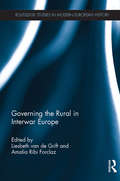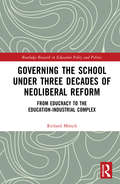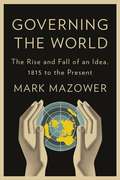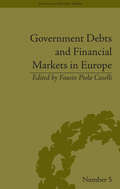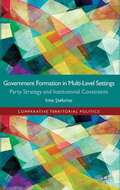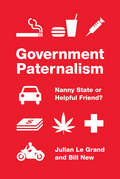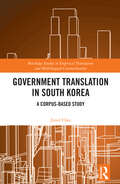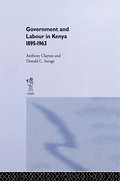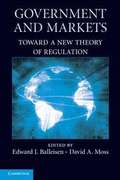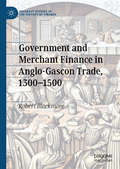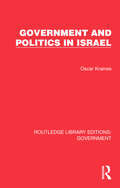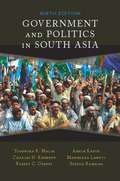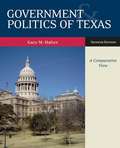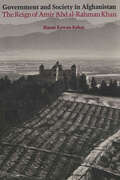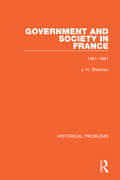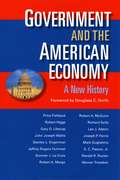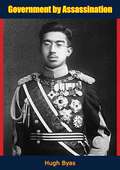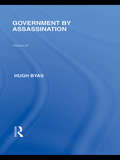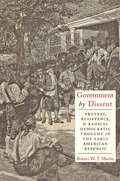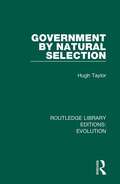- Table View
- List View
Governing the Rural in Interwar Europe (Routledge Studies in Modern European History)
by Liesbeth van de Grift Amalia Ribi ForclazThis book examines how rural Europe as a hybrid social and natural environment emerged as a key site of local, national and international governance in the interwar years. The post-war need to secure and intensify food production, to protect contested border areas, to improve rural infrastructure and the economic viability of rural regions and to politically integrate rural populations, gave rise to a variety of schemes aimed at modernizing agriculture and remaking rural society. The volume examines discourses, institutions and practices of rural governance from a transnational perspective, revealing striking commonalities across national and political boundaries. From the village town hall to the headquarters of international organizations, local authorities, government officials and politicians, scientific experts and farmers engaged in debates about the social, political and economic future of rural communities. They sought to respond to both real and imagined concerns over poverty and decline, backwardness and insufficient control, by conceptualizing planning and engineering models that would help foster an ideal rural community and develop an efficient agricultural sector. By examining some of these local, national and international schemes and policies, this volume highlights the hitherto under-researched interaction between policymakers, experts and rural inhabitants in the European countryside of the 1920s and '30s.
Governing the School under Three Decades of Neoliberal Reform: From Educracy to the Education-Industrial Complex (Routledge Research in Education Policy and Politics)
by Richard MünchThis book provides a critical analysis of the neoliberal reform agenda of the economic governance of schools. Focusing on the role of the United States in this process, it explores the transformation of schools in this agenda from educational establishments to enterprises in a competitive education market. The study uses Bourdieu to apply a field-theoretical framework to a detailed empirical analysis of the current changes of school government. Chapters explore education bureaucracy, reform and the effect of outside organizations on pedagogy and testing. The book reveals how far the promises of corporate education reform are from reality and concludes with a plea for a realistic view of school’s capabilities. It goes beyond the state of the art with its focus on how the governance of education, school and instruction is changing with the replacement of educracy by an education-industrial complex. The book will be of great interest for academics, postgraduate students, administrators and politicians in the field of education policy, the governance of school systems and schools. The book also has an international appeal as it studies a global transformation of the field of education.
Governing the World: The History of an Idea, 1815 to the Present
by Mark MazowerThe story of global cooperation between nations and peoples is a tale of dreamers goading us to find common cause in remedying humanity’s worst problems. But international institutions have also provided a tool for the powers that be to advance their own interests and stamp their imprint on the world. Mark Mazower’s Governing the World tells the epic story of that inevitable and irresolvable tension—the unstable and often surprising alchemy between ideas and power. From the beginning, the willingness of national leaders to cooperate has been spurred by crisis: the book opens in 1815, amid the rubble of the Napoleonic Empire, as the Concert of Europe was assembled with an avowed mission to prevent any single power from dominating the continent and to stamp out revolutionary agitation before it could lead to war. But if the Concert was a response to Napoleon, internationalism was a response to the Concert, and as courts and monarchs disintegrated they were replaced by revolutionaries and bureaucrats. 19th century internationalists included bomb-throwing anarchists and the secret policemen who fought them, Marxist revolutionaries and respectable free marketeers. But they all embraced nationalism, the age’s most powerful transformative political creed, and assumed that nationalism and internationalism would go hand in hand. The wars of the twentieth century saw the birth of institutions that enshrined many of those ideals in durable structures of authority, most notably the League of Nations in World War I and the United Nations after World War II. Throughout this history, we see that international institutions are only as strong as the great powers of the moment allow them to be. The League was intended to prop up the British empire. With Washington taking over world leadership from Whitehall, the United Nations became a useful extension of American power. But as Mazower shows us, from the late 1960s on, America lost control over the dialogue and the rise of the independent Third World saw a marked shift away from the United Nations and toward more pliable tools such as the World Bank and the International Monetary Fund. From the 1990s to 2007, Governing the World centers on a new regime of global coordination built upon economic rule-making by central bankers and finance ministers, a regime in which the interests of citizens and workers are trumped by the iron logic of markets. Now, the era of Western dominance of international life is fast coming to an end and a new multi-centered global balance of forces is emerging. We are living in a time of extreme confusion about the purpose and durability of our international institutions. History is not prophecy, but Mark Mazower shows us why the current dialectic between ideals and power politics in the international arena is just another stage in an epic two-hundred-year story. .
Government
by B. TravenB. Traven's magnum opus was a six-volume work of historical fiction recounting the Mexican revolution of 1910. "Government" sets the scene by describing the plight of the indigenous peoples who were ruthlessly exploited by a government completely corrupt at every level from the presidency to the village "secretaries".
Government Debts and Financial Markets in Europe (Financial History #5)
by Fausto Piola CaselliContains essays by historians of economic and financial history. It illuminates the relationships between government indebtedness and the development of financial markets in Europe from the late Middle Ages to the late twentieth century.
Government Formation in Multi-Level Settings
by Irina StefuriucThis book examines how parties negotiate coalition deals at the subnational level using the examples of Germany and Spain. In such multi-level settings, parties are present at various negotiation tables often having to make difficult choices about their role in the coalition and the relative merits of being in government over the opposition.
Government In America: People, Politics And Policy
by Martin P. Wattenberg Robert L. Lineberry George C. EdwardsAn undergraduate text concentrating on constitutional foundations, patterns of political behavior, political institutions, and public policy outputs. Contains chapter summaries, key terms, and discussion questions, and boxes on politics since the 1960s; public opinion; comparison of the US with other nations in areas such as tax rates. Includes color photos and graphics. This second edition expands coverage of theories of democracy; fiscal federalism; the Constitution and religion; the media; and candidate-centered politics. Annotation c. by Book News, Inc. , Portland, Or.
Government Paternalism
by Julian Le Grand Bill NewShould governments save people from themselves? Do governments have the right to influence citizens' behavior related to smoking tobacco, eating too much, not saving enough, drinking alcohol, or taking marijuana--or does this create a nanny state, leading to infantilization, demotivation, and breaches in individual autonomy? Looking at examples from both sides of the Atlantic and around the world, Government Paternalism examines the justifications for, and the prevalence of, government involvement and considers when intervention might or might not be acceptable. Building on developments in philosophy, behavioral economics, and psychology, Julian Le Grand and Bill New explore the roles, boundaries, and responsibilities of the government and its citizens.Le Grand and New investigate specific policy areas, including smoking, saving for pensions, and assisted suicide. They discuss legal restrictions on risky behavior, taxation of harmful activities, and subsidies for beneficial activities. And they pay particular attention to "nudge" or libertarian paternalist proposals that try to change the context in which individuals make decisions so that they make the right ones. Le Grand and New argue that individuals often display "reasoning failure": an inability to achieve the ends that they set themselves. Such instances are ideal for paternalistic interventions--for though such interventions might impinge on autonomy, the impact can be outweighed by an improvement in well-being.Government Paternalism rigorously considers whether the state should guide citizen decision making in positive ways and if so, how this should be achieved.
Government Translation in South Korea: A Corpus-based Study (Routledge Studies in Empirical Translation and Multilingual Communication)
by Jinsil ChoiGovernment Translation in South Korea: A Corpus-based Study is the first book to investigate and discuss translation processes and translation products in South Korean government institutions, employing a parallel corpus-based approach. Choi identifies different agents and procedures involved in institutional translation practices, discusses linguistic and genre features of translations, and investigates changes made in translations compared to the original documents, during the two Korean presidencies of Lee Myung-bak (2008–2013) and Park Geun-hye (2013–2017). Choi’s book explores important facets of Korean government translation in the belief that practices associated with the normative meaning and concept of government translation have to be displaced into the wider understanding of the concept of translation as a social construct. Drawing on the theoretical frameworks of institutional translation and critical discourse analysis–informed corpus-based translation studies, the chapters discuss the practice, process and products of Korean government translation. The Korean–English parallel corpus methodology used introduces a systemic way to analyse changes in Korean government translations, based on a personally built sentence-level tagged corpus, both qualitatively and quantitatively. This volume will be of great interest to scholars and students of translation studies as well as Korean studies.
Government and Labour in Kenya 1895-1963
by Anthony Clayton Donald Cockfield SavagePublished in the year 1974, Government and Labour in Kenya is a valuable contribution to the field of History.
Government and Markets: Toward a New Theory of Regulation
by Edward J. Balleisen David A. MossAfter two generations of emphasis on governmental inefficiency and the need for deregulation, we now see growing interest in the possibility of constructive governance, alongside public calls for new, smarter regulation. Yet there is a real danger that regulatory reforms will be rooted in outdated ideas. As the financial crisis has shown, neither traditional market failure models nor public choice theory, by themselves, sufficiently inform or explain our current regulatory challenges. Regulatory studies, long neglected in an atmosphere focused on deregulatory work, is in critical need of new models and theories that can guide effective policy-making. This interdisciplinary volume points the way toward the modernization of regulatory theory. Its essays by leading scholars move past predominant approaches, integrating the latest research about the interplay between human behavior, societal needs, and regulatory institutions. The book concludes by setting out a potential research agenda for the social sciences.
Government and Merchant Finance in Anglo-Gascon Trade, 1300–1500 (Palgrave Studies in the History of Finance)
by Robert BlackmoreThe Late Middle Ages (c.1300–c.1500) saw the development of many of the key economic institutions of the modern unitary nation-state in Europe. After the ‘commercial revolution’ of the thirteenth century, taxes on trade became increasingly significant contributors to government finances, and as such there were ever greater efforts to control the flow of goods and money.This book presents a case study of the commercial and financial links between the kingdom of England and the duchy of Aquitaine across the late-medieval period, with a special emphasis on the role of the English Plantagenet government that had ruled both in a political union since 1154. It establishes a strong connection between fluctuations in commodity markets, large monetary flows and unstable financial markets, most notably in trade credit and equity partnerships.It shows how the economic relationship deteriorated under the many exogenous shocks of the period, the wars, plagues and famines, as well as politically motivated regulatory intervention. Despite frequent efforts to innovate in response, both merchants and governments experienced a series of protracted financial crises that presaged the break-up of the union of kingdom and duchy in 1453, with the latter’s conquest by the French crown. Of particular interest to scholars of the late-medieval European economy, this book will also appeal to those researching wider economic or financial history.
Government and Political Life in England and France, c. 1300–c. 1500
by John Watts Fletcher, Christopher and Genet, Jean-Philippe and Watts, John Christopher Fletcher Jean-Philippe GenetHow did the kings of England and France govern their kingdoms? This volume, the product of a ten-year international project, brings together specialists in late medieval England and France to explore the multiple mechanisms by which monarchs exercised their power in the final centuries of the Middle Ages. Collaborative chapters, mostly co-written by experts on each kingdom, cover topics ranging from courts, military networks and public finance; office, justice and the men of the church; to political representation, petitioning, cultural conceptions of political society; and the role of those excluded from formal involvement in politics. The result is a richly detailed and innovative comparison of the nature of government and political life, seen from the point of view of how the king ruled his kingdom, but bringing to bear the methods of social, cultural and economic history to understand the underlying armature of royal power.
Government and Politics in Israel (Routledge Library Editions: Government)
by Oscar KrainesOriginally published in 1961, this book provides a clear authoritative work of reference, surveying not only constitutional form, but also actual political practice. The author deals in turn with the Knesset, the political parties and the electoral system, Cabinet, Presidents and Judiciary, the basis of citizenship and civil rights, the administrative structure, local government and foreign policy. The book also emphasizes the precarious balance of the new state of Israel in which immigrants exceeded the original population.
Government and Politics in South Asia
by Yogendra K MalikThis comprehensive but accessible text provides students with a systematic introduction to the comparative political study of the leading nations of South Asia: India, Pakistan, Bangladesh, Sri Lanka, and Nepal. The seventh edition is extensively revised and updated, benefiting from the fresh perspective brought on by adding a new author to the team. New material includes discussions of political parties and leaders in India, the Zardari regime and changes to the Pakistani constitution, the rocky relationship between Pakistan and the Obama administration, new prospects and dangers facing Bangladesh, continuing political violence in Sri Lanka, and the troubles facing Nepal as it attempts to draft a new constitution. Organized in parallel fashion to facilitate cross-national comparison, the sections on each nation address several topical areas of inquiry: political culture and heritage, government structure and institutions, political parties and leaders, conflict and resolution, and modernization and development. A statistical appendix provides a concise overview of leading demographic and economic indicators for each country, making Government and Politics in South Asia an invaluable addition to courses on the politics of South Asia.
Government and Politics of Texas: A Comparative View (7th edition)
by Gary M. HalterExamining and comparing the Lone Star State to the rest of the nation, this text provides students with a broad understanding of the factors that make Texas unique. The seventh edition includes a brand new chapter on Public Policy in Texas, with emphasis on policies directly relating to students. Updated information on a host of issues in Texas state and local government, including population growth, constitutional amendments, and changing partisanship in the Texas legislature is also included.
Government and Society in Afghanistan: The Reign of Amir 'Abd al-Rahman Khan (CMES Modern Middle East Series)
by Hasan Kawun KakarAn authoritative study of the administrative, social, and economic structure of Afghanistan at the beginning of the twentieth century. Government and Society in Afghanistan covers a decisive stage in the country&’s history. The period covered—the reign of the &“Iron&” Amir Rahman Khan—was in many ways the beginning of modern Afghanistan as a cohesive nation. It was under the Amir that its borders were established, its internal unification completed, and the modern concept of nationhood implanted. Hsan Kawun Kakar considers both the internal and the external forces that influenced Afghanistan&’s development. Thus, modernization, centralization, and nationalization are seen as both defensive reactions to European imperialism and a necessary step toward capital formation and industrialization. The first part of the book covers the government of the Amir, from the personality of the ruler to a comprehensive overview of taxation and local government. The second part views these economic and social institutions from the perspective of the major segments of the populace—including nomads, townsmen, tribes, women, slaves, landowners, mullahs, merchants, and others.
Government and Society in Afghanistan: The Reign of Amir 'Abd al-Rahman Khan (CMES Modern Middle East Series)
by Hasan Kawun KakarThis is an authoritative study of the administrative, social, and economic structure of Afghanistan during a decisive stage in its history. The period covered—the reign of the "Iron" Amir Rahman Khan—was in many ways the beginning of modern Afghanistan as a cohesive nation. Although Afghanistan had emerged as an entity in 1747, it was actually under the Amir that its borders were established, its internal unification completed, and the modern concept of nationhood implanted. Kakar approaches this complex process by taking into consideration both the internal and the external forces that influenced its development. Thus, modernization, centralization, and nationalization are seen as both defensive reactions to European imperialism and necessary preconditions to capital formation and, consequently, industrialization.The first part of the book covers the government of the Amir, from the personality of the ruler down to the operation of his new bureaucrats at the local level. Here Kakar presents a comprehensive treatment of the Afghan system of taxation and local government. The second part views these economic and social institutions from the perspective of the major segments of the populace—nomads, townsmen, tribes, women, slaves, landowners, mullahs, merchants, and so forth.
Government and Society in France: 1461-1661
by J. H. ShennanOriginally published in 1969, this volume provides a lucid analysis of French government and society over two centuries, from the late medieval period to the beginning of Louis XIV’s personal rule. It takes up the essential arguments, contributes some novel interpretations, challenges some assessments, and makes essential reading for anyone trying to study the history of early modern France.
Government and the American Economy: A New History
by Price V. FishbackThe American economy has provided a level of well-being that has consistently ranked at or near the top of the international ladder. A key source of this success has been widespread participation in political and economic processes. In The Government and the American Economy, leading economic historians chronicle the significance of America’s open-access society and the roles played by government in its unrivaled success story. America’s democratic experiment, the authors show, allowed individuals and interest groups to shape the structure and policies of government, which, in turn, have fostered economic success and innovation by emphasizing private property rights, the rule of law, and protections of individual freedom. In response to new demands for infrastructure, America’s federal structure hastened development by promoting the primacy of states, cities, and national governments. More recently, the economic reach of American government expanded dramatically as the populace accepted stronger limits on its economic freedoms in exchange for the increased security provided by regulation, an expanded welfare state, and a stronger national defense.
Government by Assassination (Routledge Library Editions: Japan Ser.)
by Hugh ByasHERE IS THE TRUTH ABOUT THE PATRIOTIC MURDER SOCIETIES, THE ARMY GANGSTERS, THE ARMY’S IDEA OF JAPAN’S DESTINY, AND THE STRANGE ROLE OF THE EMPEROR.In Japan the army possesses a kind of autonomy which immunizes it from control by any other agency. Long ago, Mr. Byas saw that the intoxication of this immunity would lead to war, and so he spent many years ferreting out from the secretive Japanese how the militarists gained their fantastic power.His book therefore is to Japan what Rauschning’s Revolution of Nihilism was to Germany. Starting from the grass-roots of Japanese politics, it moves steadily toward the amazing disclosure of principles. At bottom, the Japanese Army is closely allied with gangsterism. The so-called patriotic societies which do its dirty work are nothing more than leagues of murderers, blackmailers, and thieves. Byas shows how these terrorists made contact years ago with certain groups of appreciative younger officers, and how consequently almost every civilian leader who curbed the army’s power was assassinated.Mr. Byas then asks what the basic program and philosophy of such a power group can be; and shows that it is aggression abroad and reaction at home. Japan was to become a war machine. 80% of its product was to go to the army, and the people were to live on the balance. The efficient planning and centralization of Marxism were to be used, but stripped of the hated component of democracy. Japan, like Germany, believes that it is a nation with a destiny, and that war pays. The furious Japanese egomania is centered in the Emperor and the notion of his divine descent. Mr. Byas therefore devotes several chapters to the hocus-pocus that surrounds this personage. He ends with a powerful and clear-headed discussion about the future.
Government by Assassination (Routledge Library Editions: Japan)
by Hugh ByasWritten by someone who spent twenty-three years as a journalist in Japan, this book describes the political and military aspirations of Japan at a tumultuous period of twentieth century history. The book examines the workings of the Japanese government and discusses the role of the military in shaping political ideals: ideals which were a compound of Marxism and National Socialism, transformed for Japanese uses and combined with fanatical racial, national and semi-religious obsessions.
Government by Dissent: Protest, Resistance, and Radical Democratic Thought in the Early American Republic
by Robert W.T. Martin"The most thorough examination we have of how early Americans wrestled with what types of political dissent should be permitted, even promoted, in the new republic they were forming. Martin shows the modern relevance of their debates in ways that all will find valuable—even those who dissent from his views!"—Rogers M. Smith, Christopher H. Browne Distinguished Professor of Political Science, University of Pennsylvania Democracy is the rule of the people. But what exactly does it mean for a people to rule? Which practices and behaviors are legitimate, and which are democratically suspect? We generally think of democracy as government by consent; a government of, by, and for the people. This has been true from Locke through Lincoln to the present day. Yet in understandably stressing the importance—indeed, the monumental achievement—of popular consent, we commonly downplay or even denigrate the role of dissent in democratic governments. But in Government by Dissent, Robert W.T. Martin explores the idea that the people most important in a flourishing democracy are those who challenge the status quo. The American political radicals of the 1790s understood, articulated, and defended the crucial necessity of dissent to democracy. By returning to their struggles, successes, and setbacks, and analyzing their imaginative arguments, Martin recovers a more robust approach to popular politics, one centered on the ever-present need to challenge the status quo and the powerful institutions that both support it and profit from it. Dissent has rarely been the mainstream of democratic politics. But the figures explored here—forgotten farmers as well as revered framers—understood that dissent is always the essential undercurrent of democracy and is often the critical crosscurrent. Only by returning to their political insights can we hope to reinvigorate our own popular politics.
Government by Natural Selection (Routledge Library Editions: Evolution #13)
by Hugh TaylorOriginally published in 1915, Government by Natural Selection looks at the historical advancement of government through the lens of the Darwinian theory of natural selection. The book examines the history of government and its formation, right up until the early 20th century, when the book was first published. The book suggests that there is a link between Darwinian theory and the development of humans in societies, and that this in turn affected the formation of government over the course of history. The book uses not only Darwinian theory to examine history and the formation of government, but philosophers from both antiquity and the 19th century. This book provides a fascinating examination of politics and history through the application of science, and will be of interest to anthropologists, historians and academics of politics alike.
Government by the People (Twenty-Second Edition)
by Paul C. Light David B. Magleby David M. O'Brien J.W. Peltason [et al.]Building on decades of authoritative scholarship, this completely updated text continues to offer accessible, carefully crafted, and straightforward coverage of the foundations of American politics, as well consistent focus on the achievements of a government by the people In an increasingly cynical world, GBTP emphasizes that politics matters and encourages, motivates, and even inspires students-with accounts of individual and collective acts of courageousness, intellect, and integrity in the political arena-to be effective and informed citizens. With each chapter now framed by nationally-selected learning objectives and chapter mastery self-tests, several compelling new features, and an all new contemporary design, this thoroughly updated Twenty-Third Edition continues in the book's long tradition for excellence. As we enter this very complex political era, there is no more reliable or more relevant text to help you advance your students from being simple onlookers to knowledgeable participants in the American political experience.
